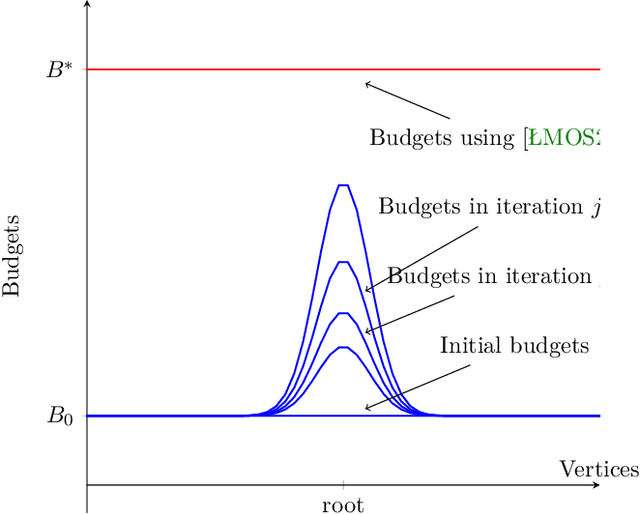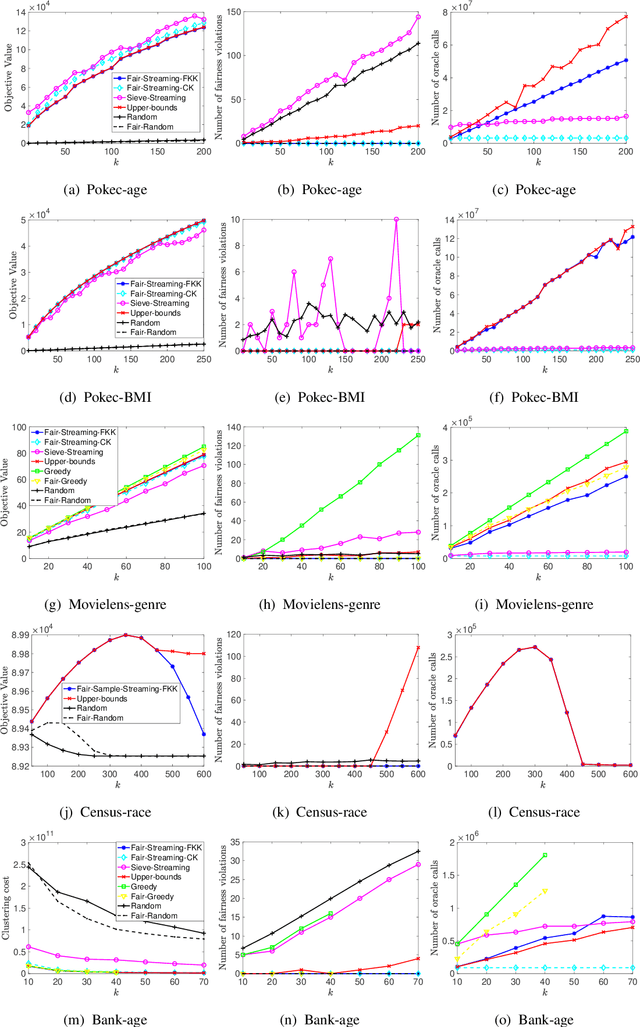Jakab Tardos
Fairness in Streaming Submodular Maximization over a Matroid Constraint
May 24, 2023
Abstract:Streaming submodular maximization is a natural model for the task of selecting a representative subset from a large-scale dataset. If datapoints have sensitive attributes such as gender or race, it becomes important to enforce fairness to avoid bias and discrimination. This has spurred significant interest in developing fair machine learning algorithms. Recently, such algorithms have been developed for monotone submodular maximization under a cardinality constraint. In this paper, we study the natural generalization of this problem to a matroid constraint. We give streaming algorithms as well as impossibility results that provide trade-offs between efficiency, quality and fairness. We validate our findings empirically on a range of well-known real-world applications: exemplar-based clustering, movie recommendation, and maximum coverage in social networks.
Efficient and Local Parallel Random Walks
Dec 01, 2021



Abstract:Random walks are a fundamental primitive used in many machine learning algorithms with several applications in clustering and semi-supervised learning. Despite their relevance, the first efficient parallel algorithm to compute random walks has been introduced very recently (Lacki et al.). Unfortunately their method has a fundamental shortcoming: their algorithm is non-local in that it heavily relies on computing random walks out of all nodes in the input graph, even though in many practical applications one is interested in computing random walks only from a small subset of nodes in the graph. In this paper, we present a new algorithm that overcomes this limitation by building random walk efficiently and locally at the same time. We show that our technique is both memory and round efficient, and in particular yields an efficient parallel local clustering algorithm. Finally, we complement our theoretical analysis with experimental results showing that our algorithm is significantly more scalable than previous approaches.
Streaming Belief Propagation for Community Detection
Jun 10, 2021



Abstract:The community detection problem requires to cluster the nodes of a network into a small number of well-connected "communities". There has been substantial recent progress in characterizing the fundamental statistical limits of community detection under simple stochastic block models. However, in real-world applications, the network structure is typically dynamic, with nodes that join over time. In this setting, we would like a detection algorithm to perform only a limited number of updates at each node arrival. While standard voting approaches satisfy this constraint, it is unclear whether they exploit the network information optimally. We introduce a simple model for networks growing over time which we refer to as streaming stochastic block model (StSBM). Within this model, we prove that voting algorithms have fundamental limitations. We also develop a streaming belief-propagation (StreamBP) approach, for which we prove optimality in certain regimes. We validate our theoretical findings on synthetic and real data.
Fairness in Streaming Submodular Maximization: Algorithms and Hardness
Oct 18, 2020
Abstract:Submodular maximization has become established as the method of choice for the task of selecting representative and diverse summaries of data. However, if datapoints have sensitive attributes such as gender or age, such machine learning algorithms, left unchecked, are known to exhibit bias: under- or over-representation of particular groups. This has made the design of fair machine learning algorithms increasingly important. In this work we address the question: Is it possible to create fair summaries for massive datasets? To this end, we develop the first streaming approximation algorithms for submodular maximization under fairness constraints, for both monotone and non-monotone functions. We validate our findings empirically on exemplar-based clustering, movie recommendation, DPP-based summarization, and maximum coverage in social networks, showing that fairness constraints do not significantly impact utility.
 Add to Chrome
Add to Chrome Add to Firefox
Add to Firefox Add to Edge
Add to Edge